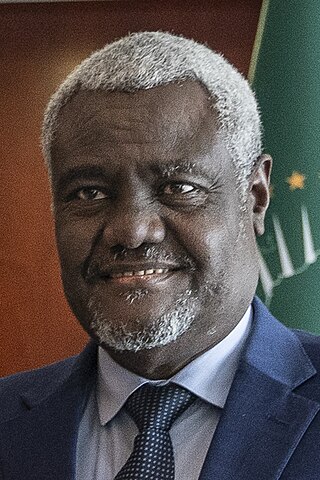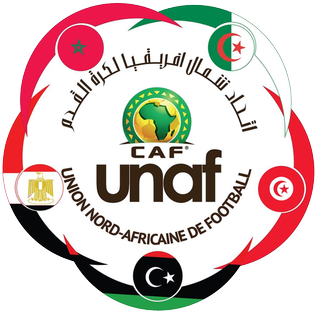
President is a common title for the head of state in most republics. The president of a state is, generally speaking, the head of the government and the fundamental leader of the country or the ceremonial head of state.

The United Nations Economic and Social Council is one of the six principal organs of the United Nations, responsible for coordinating the economic and social fields of the organization, specifically in regards to the fifteen specialised agencies, the eight functional commissions, and the five regional commissions under its jurisdiction.

In the administrative divisions of France, the department is one of the three levels of government under the national level, between the administrative regions and the communes. Ninety-six departments are in metropolitan France, with an additional five constituting overseas departments, which are also classified as overseas regions. Departments are further subdivided into 333 arrondissements and 2,054 cantons. These last two levels of government have no political autonomy, instead serving as the administrative basis for the local organisation of police, fire departments as well as, in certain cases, elections.

French Equatorial Africa was a federation of French colonial territories in Equatorial Africa which consisted of Gabon, French Congo, Ubangi-Shari, and Chad. It existed from 1910 to 1958 and its administration was based in Brazzaville.

France is divided into eighteen administrative regions, of which thirteen are located in metropolitan France, while the other five are overseas regions.

The Fifth Republic is France's current republican system of government. It was established on 4 October 1958 by Charles de Gaulle under the Constitution of the Fifth Republic.

French West Africa was a federation of eight French colonial territories in West Africa: Mauritania, Senegal, French Sudan, French Guinea, Ivory Coast, Upper Volta, Dahomey and Niger. The federation existed from 1895 until 1958. Its capital was Saint-Louis in Senegal until 1902, and then Dakar until the federation's collapse in 1960.
The overseas departments and regions of France are departments of the French Republic which are outside the continental Europe situated portion of France, known as "metropolitan France". The distant parts have exactly the same status as mainland France's regions and departments. The French Constitution provides that, in general, French laws and regulations apply to French overseas regions the same as in metropolitan France, but can be adapted as needed to suit the region's particular needs. Hence, the local administrations of French overseas regions cannot themselves pass new laws. On occasion referendums are undertaken to re-assess the sentiment in local status.

Moussa Faki MahamatMūsā Fakī Muḥammad, born 21 June 1960) is a Chadian politician and diplomat who has been the elected Chairperson of the African Union Commission since 14 March 2017. Previously he was Prime Minister of Chad from 24 June 2003 to 4 February 2005 and Minister of Foreign Affairs from April 2008 to January 2017. Faki, a member of the ruling Patriotic Salvation Movement (MPS), belongs to the Zaghawa ethnic group, the same group as the late President Idriss Déby.

The Latin Union is an international organization of nations that use Romance languages, whose activities have been suspended and transferred many of its activities to the Ibero-American Summit since 2012. Headquartered in Paris, France, it aims to protect, project, and promote the common cultural heritage of Romance peoples and unifying identities of the Romance, and Romance-influenced, world. It was created in 1954 in Madrid, Spain. It started to operate in 1983 and its membership rose from 12 to 36 states, including countries in North America, South America, Northern Europe, Southern Europe, Africa, and the Asia-Pacific region.

The president of the United Nations General Assembly is a position voted by representatives in the United Nations General Assembly (UNGA) on a yearly basis. The president is the chair and presiding officer of the General Assembly.

The International Federation of Journalists (IFJ) is the largest global union federation of journalists' trade unions in the world. It represents more than 600,000 media workers from 187 organisations in 146 countries.

The G4 nations, comprising Brazil, Germany, India, and Japan, are four countries which support each other's bids for permanent seats on the United Nations Security Council. Unlike the G7, where the common denominator is the economy and long-term political motives, the G4's primary aim is the permanent member seats on the Security Council. Each of these four countries have figured among the elected non-permanent members of the council since the UN's establishment. Their economic and political influence has grown significantly in the last decades, reaching a scope comparable to the permanent members (P5). However, the G4's bids are often opposed by the Uniting for Consensus movement, and particularly their economic competitors or political rivals.

The African Academy of Sciences (AAS) is a non-aligned, non-political, not-for-profit, pan-African learned society formed in 1985.

The departmental councils of France are representative assemblies elected by universal suffrage in 98 of the country's 101 departments. Prior to the 2015 French departmental elections they were known as general councils.

The Union of North African Football is an association football organising body. It was launched in 2005 by the North African members of the Confederation of African Football (CAF), Algeria, Egypt, Libya, Morocco and Tunisia. The post of president will be rotated among the five founding nations.

Elections to the General Council were held in French Dahomey on 15 December 1946 and 5 January 1947. The result was a victory for the Dahomeyan Progressive Union, which won 20 of the 30 seats.
United Nations Secretary-General selection is the process of selecting the next secretary-general of the United Nations. To be selected as secretary-general, a candidate must receive the votes of at least nine members of the United Nations Security Council, with no vetoes from permanent members. The secretary-general is then appointed by a majority vote of the United Nations General Assembly.

Territorial Assembly elections were held in Senegal on 30 March 1952. The Senegalese Democratic Bloc won 41 of the 50 seats.














